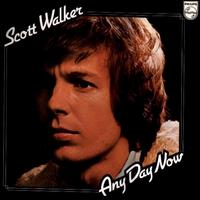Availability
The continued unavailability of Any Day Now is believed to be due to Walker's dissatisfaction with his albums from the early to mid-1970s, as well as the 1969 Scott: Scott Walker Sings Songs from his T.V. Series album, all of which were made up entirely of cover versions and which he describes in the documentary Scott Walker: 30 Century Man as his "wilderness years". Walker blocked CD re-releases of T.V Series, The Moviegoer (1972) and Any Day Now, while Stretch (1973) and We Had It All (1974) were re-released on CD in 1997 by an independent label without Walker's own approval. [2]
In spite of the album's deletion, over half of the songs were released during the 2000s on Scott Walker compilation CDs. "The Me I Never Knew", "We Could Be Flying", "Do I Love You?", "When You Get Right Down to It", "Cowboy", and "All My Love's Laughter" are included on 2005's Classics & Collectibles, while "Any Day Now" is included on the 2004 budget-priced The Collection. "If Ships Were Made To Sail" appears on a various artists compilation CD of Jimmy Webb penned songs titled And Someone Left The Cake Out In The Rain, released in 1998. "Maria Bethania", "If" and "Ain't No Sunshine" remain unavailable.
This page is based on this
Wikipedia article Text is available under the
CC BY-SA 4.0 license; additional terms may apply.
Images, videos and audio are available under their respective licenses.
